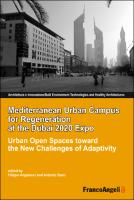Mediterranean Urban Campus for Regeneration at the Dubai 2020 Expo
Urban Open Spaces toward the New Challenges of Adaptivity
Contributor(s)
ANGELUCCI, Filippo (editor)
BASTI, Antonio (editor)
Language
EnglishAbstract
Adaptivity of the urban open spaces to face the climatic, socio-ecological, multicultural and health challenges, raises questions with multiple design implications, which cannot be solved only with the functional, formal, and technical rethinking of the space.
A real adaptivity of the urban open spaces can only result from an informational redirection of the project aimed at raising the integrated capabilities of nature, individuals, organizations, and spaces. This is an interpretation of designing that involves a substantial rethinking of scenarios, visions, and concepts, in terms of plural projection of multiple, flexible, and reversible responses. It is also a new condition of the design experience that can only develop through an interdisciplinary and choral practice, based on comparison and continuous dialogue between different design knowledge and living cultures.
This volume collects the results of the Mediterranean Urban Campus for Regeneration project, that was selected by the Italian Ministry of Foreign Affairs among the initiatives carried out at the Italy Pavilion of Expo 2020 in Dubai. All the activities were conducted by an international universitarian team of professors, researchers, and PhD students.
Today, the metropolis of Dubai is characterized by an extreme climatic-environmental conditions and, at the same time, by an almost infinite capacity to regulate the living spaces through the most innovative technologies. The theme of adaptive design of open urban spaces has been contextualized in some case-study areas of Dubai. The results of the metadesign, debate, workshop and comparison process between the participants outlined a complex framework of different development trajectories, both for the designing innovation of the urban open spaces, and for the launch of new teaching methods of architectural, technological, and urban project. This experience has made it possible to identify issues, approaches, and design criteria – on urban and building scale – potentially replicable also in the Mediterranean contexts that are today affected by an exacerbation of climatic phenomena, such as the rise in temperatures and the consequent need to overturn the consolidates axioms and design practices. For these reasons, the experience of the Mediterranean Urban Campus for Regeneration can represent a useful anticipation of operating methods to be transferred on the Italian urban territories. Reflecting on these issues means understanding how the university research can take an active role in the development of studies and scenarios to support the operational actions at the land and local level.
Keywords
Urban Open Space; Metadesign; Interdisciplinarity; Tecnological-Environmental Design; Urban Design; Climate Change; Adaptive Architecture; Ephemeral SpaceISBN
9788835150008Publisher
FrancoAngeliPublisher website
https://www.francoangeli.it/Home.aspxPublication date and place
Milan, 2022Series
Architettura e Innovazione: Built Environment Technologies and Healthy Architectures,Classification
Environmentally-friendly (‘green’) architecture and design
Architecture: public, commercial and industrial buildings
Climate change
Environmental science, engineering and technology


 Download
Download Web Shop
Web Shop